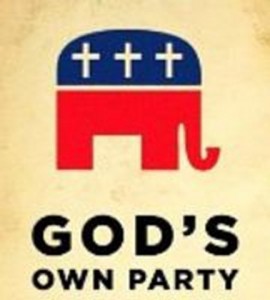“God Told Me to Run” – Analyzing the Divine Calling to Run for President

As the Presidential election reaches its climax and the nominees of each major party are selected, America is constantly reminded of the arduous nature of federal elections. Time, money and effort are expended daily by presidential campaigns, so much so that one is forced to wonder why anyone would dedicate themselves to such a consuming process.
Of course, this overwhelming commitment is easier for candidates who believe themselves to be divinely favored or compelled by some higher power to run. Representative Michelle Bachmann, for instance, said she felt “that calling and that tugging on my heart that this (running for president) is the right thing to do.” Surprisingly, God hedged his bets by telling other candidates that they too should run for President. Former candidate Herman Cain said, “I finally realized that it was God saying that this is what I needed to do” while Texas Governor Rick Perry claimed he didn’t want to do it, but he felt the Lord was calling him.
God, apparently, seems to have a problem with commitment. This presumably divine and omnipotent being could have made any of these “favored” candidates the president, but instead he allowed all of them to fail in their bids for the presidency. So what does this mean for God, and for the candidates that claim to be doing his work in running for president?
This scenario leaves several possible explanations: God is a particularly cruel practical joker that likes to waste people’s time and money, God never really endorsed anyone for President (and may not even exist in the first place), or the American electorate doesn’t particularly favor candidates that base their campaign’s legitimacy upon some sort of divine mandate.
While the first option would be rather funny, it seems to be a bit far-fetched and unverifiable. The second option is also hard to prove one way or the other, as the existence of God hasn’t even been confirmed in the first place. The third option, that the American electorate doesn’t support religious mandates as a reason for running, is a bit more approachable. The American public certainly is religious, although the number of nonbelievers is undoubtedly growing, which may account for the inability of the aforementioned candidates’ campaigns to convince voters that a higher power wanted them to run. Additionally, Americans may have been turned off by the large number of mainstream candidates that claimed to be God’s sole representative in the Presidential race.
Whatever the reason, one thing seems relatively certain: saying God told you to run isn’t necessarily the best way to run a campaign. It alienates secular voters and can make you look a bit foolish if you are just one of a crowd of “divinely favored” candidates. Candidates should instead focus on garnering legitimacy for their respective campaigns through serious policy proposals that offer something new and inspiring. Ideally, these proposals are based upon secular and humanistic values, but they don’t have to be so long as they comply with the standards set forth in the Constitution.
Religious people have the right to believe in whatever they feel like believing in, and nonbelievers also have the right not to vote for them. However, we might all be able to find common ground if religious candidates stated that they were running primarily to help the nation, and not because God told them to run. We all want to see our nation prosper, and in this respect we have much in common with our fellow human beings. If we could only remove the offensive and unprovable claims to divine favor, perhaps we could get started on a making our nation and our planet a better and safer place to inhabit.
